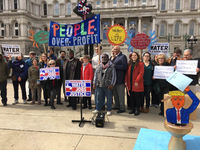Baltimore votes to become first large U.S. city to ban water privatisation
Baltimore's aging infrastructure has drawn increasing attention from private water companies seeking to take over management of parts of the city systems.
WASHINGTON - The city of Baltimore voted overwhelmingly Tuesday to ban the privatisation of its water and sewerage systems, in what supporters say is the first large U.S. jurisdiction to take such a step.
About 77 percent of more than 148,000 voters backed a proposal to alter the city's charter to declare the "inalienability" of its sewerage and water-supply systems, with most votes counted Wednesday morning.
A Baltimore official said multiple cities have expressed interest in similar provisions.
The measure "sends a strong message to private corporations," said Rianna Eckel, Maryland state organiser for Food & Water Watch, an advocacy group that promoted the ballot initiative.
"It prohibits any asset sales or leases of the system," she added. "It's not a sure-fire trick to prevent any privatisation ever, but it prohibits the most dangerous efforts," she added.
Baltimore has one of the oldest water systems in the country, and decades of deferred maintenance have resulted in a quadrupling of water rates since 2000, Eckel said.
It has also prompted worries that privatisation would cause further spikes, and that the city would have no control over who these most affected.
Eckel pointed to Food & Water Watch research finding that private water utilities tend to charge almost 60 percent more than public counterparts.
Baltimore's aging infrastructure has drawn increasing attention from private water companies seeking to take over management of parts of the city systems, according to Lester Davis, deputy chief of staff for City Council President Bernard C. "Jack" Young, the amendment proposal's chief proponent.
"There was a lot of chatter that we needed to close the door on," said Davis, noting that Young doesn't believe water systems "should be subject to the whims of the private market."
The mayor and city council have already signed off on the new measure.
Water company Veolia North America was unable to provide comment for this story by deadline. Another key company, Suez North America, failed to respond to a request for comment. Both companies have approached Baltimore in recent years, according to Eckel.
Other cities are already taking note.
After the city council of Pittsburgh, another post-industrial city, recently hosted peers from Baltimore on the issue, Pittsburgh council member Erika Strassburger told the Thomson Reuters Foundation that the discussions were "enlightening" as her city undergoes its own conversations about the future of its water system.
Most members of the council, she noted, "appear resistant to privatising our water system."

